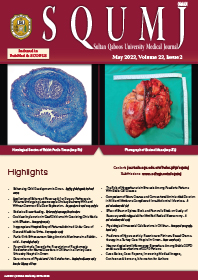Main Article Content
Abstract
Objectives: Cochlear implantation (CI) is a definitive treatment for profound hearing loss in children and adults. Operating on an infected ear is considered a challenge. Hence, CI in the presence of otitis media with effusion (OME) prior to CI surgery has sparked a debate among neurotologists: treat the OME first or go ahead with surgical intervention. This study was conducted to determine whether CI in patients with OME at the time of the surgery has any influence on the surgery procedure, post-operative complications and surgical outcome. Methods: A retrospective descriptive analysis of data collected from records of patients who underwent CI surgery in Al Nahdha Hospital, Muscat, Oman, from 2000 to 2018 was conducted. The targeted age group was six months to 14 years old, excluding all adults and patients whose operations were done outside the chosen institution. Results: Out of 369 children, 175 had OME preceding surgery compared to 194 who did not have OME. Intraoperative oedematous hypertrophied middle ear mucosa was observed only in patients with OME (n = 18; P <0.050). Moreover, among the patients with OME, mild intraoperative bleeding occurred in six cases compared to only one case in the non-OME group (P <0.050). Overall, no significant difference was observed in postoperative surgical complications between the two groups (P >0.050). Conclusion: The presence of OME is associated with intraoperative technical difficulties, such as impaired visualisation and bleeding. However, OME is not determinative in performing CI in terms of postoperative complications and outcome. Therefore, there is no need to delay CI until the OME resolves.
Keywords: Children; Cochlear Implantation; Otitis Media with Effusion; Sensorineural Hearing Loss; Oman.
Article Details

This work is licensed under a Creative Commons Attribution-NoDerivatives 4.0 International License.
